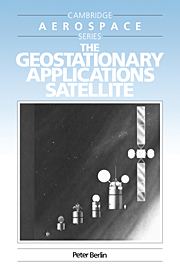Book contents
- Frontmatter
- Contents
- Dedication
- Preface
- List of Acronyms
- 1 Launch vehicles
- 2 The transfer orbit
- 3 The geostationary orbit
- 4 The satellite environment
- 5 Structures
- 6 Mechanisms
- 7 Thermal control
- 8 Power supply and conditioning
- 9 Propulsion and orbit control
- 10 Attitude stabilization, measurement and control
- 11 Telemetry, tracking and command (TT&C)
- 12 Communications payload
- 13 Meteorological payload
- 14 Product assurance
- 15 Spacecraft development and testing
- Index
- Frontmatter
- Contents
- Dedication
- Preface
- List of Acronyms
- 1 Launch vehicles
- 2 The transfer orbit
- 3 The geostationary orbit
- 4 The satellite environment
- 5 Structures
- 6 Mechanisms
- 7 Thermal control
- 8 Power supply and conditioning
- 9 Propulsion and orbit control
- 10 Attitude stabilization, measurement and control
- 11 Telemetry, tracking and command (TT&C)
- 12 Communications payload
- 13 Meteorological payload
- 14 Product assurance
- 15 Spacecraft development and testing
- Index
Summary
Introduction
In early 1986, a series of launch vehicle disasters temporarily crippled space activities in the West. The first disaster was also the greatest when in January the space shuttle Challenger carrying seven astronauts and a very costly TDRS data relay satellite exploded 72 s after lift-off. In April a Titan vehicle blew up within seconds after lift-off, destroying a sophisticated military surveillance satellite; it was, moreover, the second successive loss of a Titan after a long history of successful launches. Shortly afterwards a Delta launch was aborted in flight when the main engine closed down prematurely due to an electrical fault. The US Weather Service lost an urgently needed GOES satellite in the process. As a direct consequence of the Delta accident, impending Atlas/Centaur launches were postponed for many months while design similarities between the two vehicles were investigated. Finally, in May, the European Ariane rocket brought down an Intelsat- VA communications satellite when the launch vehicle failed for the fourth time in only 18 launches.
In these circumstances, Western space organizations with satellites awaiting launch began to look eastward for substitute launch vehicles. The purpose of this initiative was twofold: to find launch opportunities in the medium term, and to forestall any attempt by a recovering Western launch service agency to establish a commercial monopoly. The USSR and China responded favourably with offers for flights on Proton and Long March, respectively.
- Type
- Chapter
- Information
- The Geostationary Applications Satellite , pp. 1 - 28Publisher: Cambridge University PressPrint publication year: 1988



